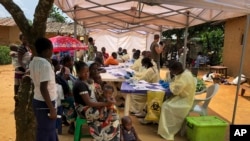South Sudan’s health officials are ramping up efforts to prevent the deadly Ebola virus from entering the country following a confirmed case some 70 kilometers from the border, in the northern Democratic Republic of Congo.
Dr. Pinyi Nyimol, South Sudan's director general for disease control and emergency response services, said the health ministry has sent seven personnel to the Yei River state, which borders Congo. "The aim is to strengthen the surveillance and preparedness for Ebola,” Nyimol told VOA's South Sudan in Focus.
“We are more worried because it is coming nearer because people are moving, so anybody, a contact can cross to South Sudan and the only thing we can do is to enhance our surveillance and screening and also to alert our health care workers about this and anybody coming, they have to start with traveling history and ask whether this person has been in DRC or not,” Nyimol said.
The case was registered Tuesday in Ariwara, a trading center. The person, a 40-year-old woman, had traveled some 500 kilometers from Beni, in Congo's North Kivu province, according to Congolese officials.
North Kivu is an epicenter of the Ebola outbreak that has killed more than 1,500 people.
Nyimol says it is the first confirmed case close to the South Sudan-DRC border since the outbreak erupted last August in eastern Congo.
He said for the last six months, South Sudan has been under high alert and increased its surveillance response at several border screening centers.
“We have points of entry doing screening at the high-risk states, we have Ebola treatment unit here in Juba and there is a laboratory and we have an ambulance ready for any suspect and there are trained staff and if there is a suspected case at Juba International Airport, it can be collected and taken for investigation; the same [is true] at the Juba Nimule border entry,” said Nyimol.
A number of people from the DRC cross into South Sudan’s Yei River State on a daily basis, according to South Sudanese health officials.
The Ebola virus is a deadly disease that affects humans and non-human primates. Symptoms include unexplained bleeding, high fever, severe headache, muscle pain, weakness, and vomiting. The virus is spread through body fluids, such as the blood of an infected person.
